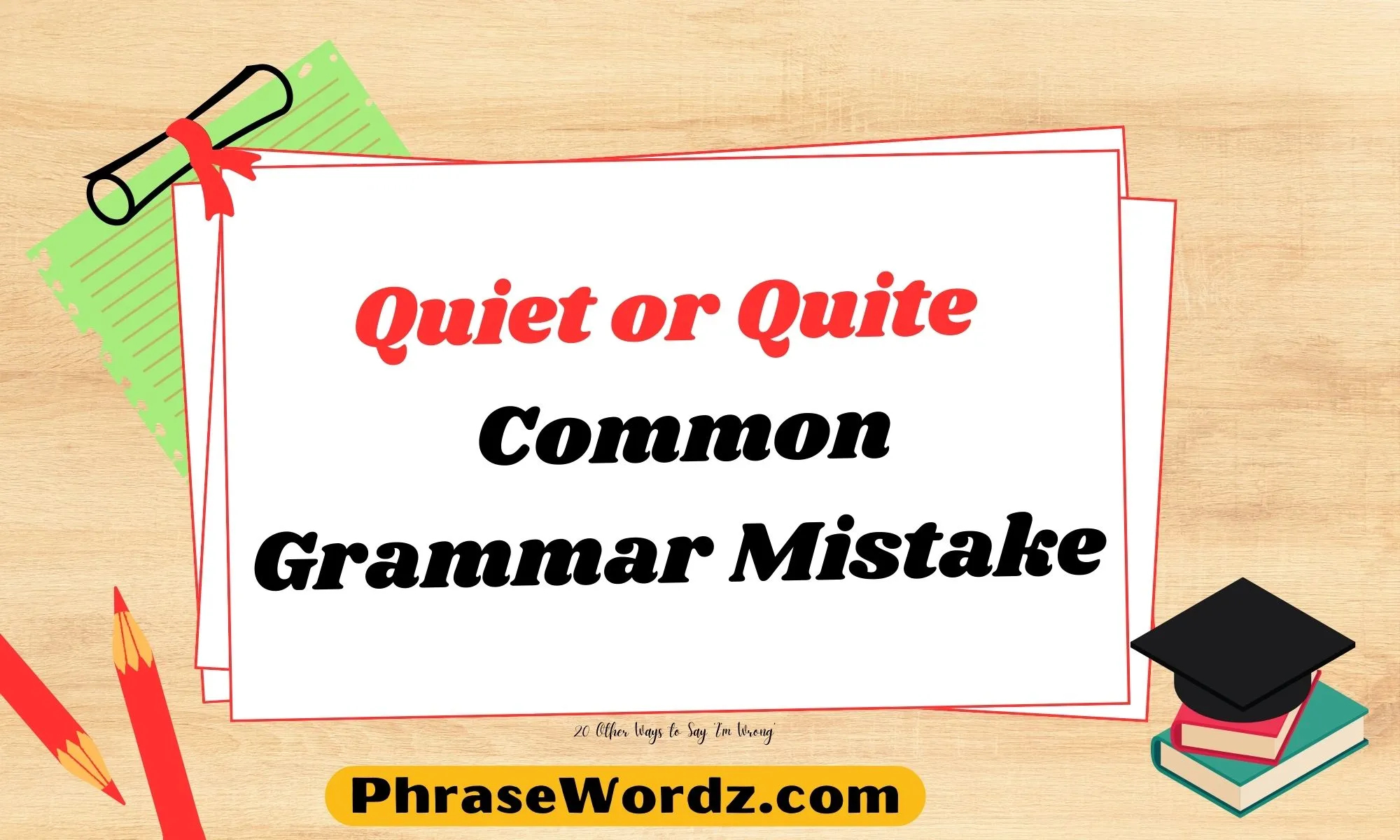The English language, though universally spoken, can be tricky when it comes to spelling and usage. One frequent grammar mistake revolves around the words “quiet” and “quite.” While they appear almost identical at a glance, they convey completely different meanings.
Quiet or Quite – Common Grammar Mistake: Confused between quiet (silence) and quite (to some degree)? This guide clears up the difference with practical examples and tips to enhance your grammar skills effortlessly!
Misusing these words can lead to confusion in both writing and speaking. This article will explore the distinctions between “quiet” and “quite,” their correct applications, and offer practical examples, including scenarios such as emails and dialogues, to help you master their usage.
What Does “Quiet” Mean?
The word “quiet” refers to silence or a lack of noise. It functions as an adjective, noun, or verb, depending on the context:
- As an adjective: Describing something calm, noiseless, or tranquil.
- As a noun: Representing the state of being free from noise.
- As a verb: Meaning to make something silent or calm.
Example Sentences
- Adjective: The library was unusually quiet today.
- Noun: The quiet of the forest was peaceful.
- Verb: She tried to quiet the crying baby.
What Does “Quite” Mean?
The word “quite” is an adverb that modifies adjectives or verbs. It generally means to a certain degree or completely, depending on the context:
- To some extent: Suggesting partial agreement or intensity.
- Completely: Indicating absolute agreement or emphasis.
Example Sentences
- To some extent: The movie was quite entertaining, but not the best I’ve seen.
- Completely: I’m quite sure we’ll finish the project on time.
Quiet vs. Quite – Spotting the Difference
The primary difference lies in their meanings and grammatical roles:
| Word | Meaning | Function | Example |
|---|---|---|---|
| Quiet | Silence or calm | Adjective/Noun/Verb | The house is quiet after midnight. |
| Quite | To some degree or completely | Adverb | She’s quite talented at painting. |
To distinguish them, consider the sentence’s context: Are you describing silence (quiet) or intensity/completeness (quite)?
Common Mistakes and How to Avoid Them
Mistake 1: Typing “quite” instead of “quiet”
Incorrect: The room was quite when we entered.
Correct: The room was quiet when we entered.
Mistake 2: Using “quiet” instead of “quite” to modify intensity
Incorrect: I’m quiet certain about the results.
Correct: I’m quite certain about the results.
Tip: Remember that “quiet” describes silence, while “quite” emphasizes a degree of certainty or quality.
Scenario Examples
Scenario 1: Clarifying in an Email
Subject: Clarification Needed on Feedback
Dear Sarah,
Thank you for your email. I wanted to clarify a minor detail. In your last message, you wrote:
“The team was quite during the discussion.”
Did you mean the team was quiet (silent and not participating)? Or were you emphasizing that they were quite (somewhat or entirely) active during the discussion?
Your clarification will help me understand better.
Best regards,
Anna
Explanation: The confusion here arises from the interchangeable misuse of “quiet” and “quite.” Ensuring clarity avoids miscommunication.
Scenario 2: A Casual Text Exchange
Emily: Did you enjoy the play last night?
James: Yes, it was quite good! The actors were amazing.
Emily: That’s wonderful. It must have been so quiet in the theater during the dramatic scenes.
Explanation: This example demonstrates the distinct contexts where “quiet” and “quite” are appropriately used.
Additional Tips to Avoid Confusion
- Focus on Pronunciation
- Quiet: Two syllables, pronounced as /ˈkwīət/.
- Quite: One syllable, pronounced as /kwīt/.
- Contextual Clues
- If the sentence implies silence or calm, quiet is the correct choice.
- If it modifies intensity, quite is the word you’re looking for.
- Practice Makes Perfect
Write a few sentences using both words to solidify understanding.
Advanced Usage Examples
Formal Business Context
Subject: Observations During the Workshop
Dear Team,
I wanted to share my observations from the workshop yesterday. The participants were exceptionally quiet during the initial presentations, which I believe reflected their focus. Later, during the interactive sessions, they were quite engaged, asking insightful questions and sharing valuable feedback.
This balance of attentiveness and participation greatly contributed to the workshop’s success.
Best regards,
Michael
Explanation: In this email, both words are used correctly to describe different aspects of behavior.
Literary Context
- Quiet: The moon cast its soft glow over the quiet village, where only the sound of rustling leaves could be heard.
- Quite: It was quite a remarkable sight, with the shimmering stars painting the night sky.
Explanation: Both words enrich the narrative by adding descriptive depth.
Common Expressions with “Quiet” and “Quite”
Expressions with “Quiet”
- Peace and quiet
- Keep it quiet
- Quiet as a mouse
Expressions with “Quite”
- Quite a few
- Quite some time
- Not quite right
Exercises for Mastery
Fill in the Blanks
- The library is always _______ in the mornings. (quiet/quite)
- I’m _______ sure we’ll win the competition. (quiet/quite)
- Please keep this information _______; it’s confidential. (quiet/quite)
Answers:
- quiet
- quite
- quiet
Conclusion
Mastering the difference between “quiet” and “quite” is essential for clear communication. By understanding their meanings, grammatical roles, and contexts, you can avoid embarrassing mistakes and enhance your writing and speaking skills. Keep practicing, and you’ll find that distinguishing these two words becomes second nature.
If you have any specific questions or examples to share, feel free to reach out—it’s quite simple to clear up any confusion with a little guidance!











